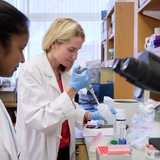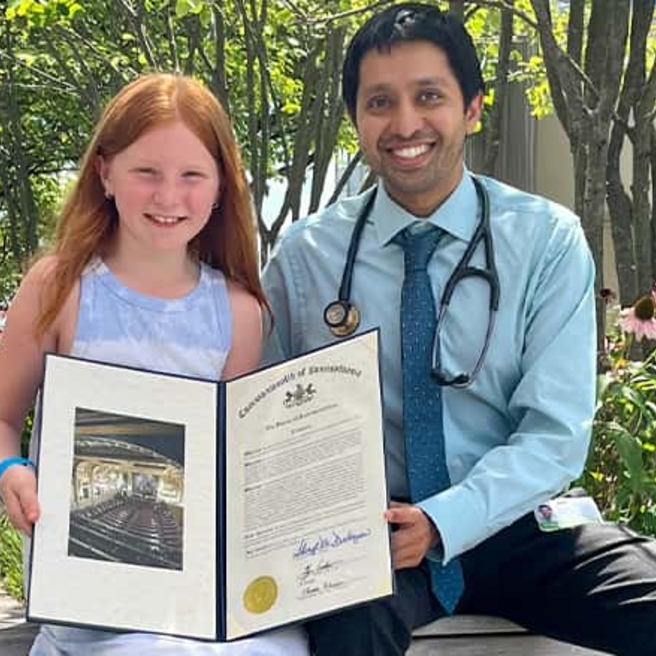Division of Gastroenterology, Hepatology and Nutrition

At our Division of Gastroenterology, Hepatology and Nutrition (GI), your child will receive compassionate and high-quality care from a team of experts who practice family-centered care. That means your family will always be included in discussions related to your child's diagnosis, treatment plan and progress.
We offer one of the largest and most robust pediatric GI divisions in the United States, with more than 60 gastroenterologists on staff and hundreds of support staff. Each year, our division sees about 50,000 outpatient visitors, has 14,000 inpatient encounters and performs nearly 9,000 procedures.
Our team works with your family and your child's primary care physician to ensure every member of your child’s care team is informed about treatment decisions and continued care.
How we serve you
We offer a variety of specialized programs and clinical services to children with gastrointestinal, liver, pancreatic and nutritional concerns and their families.
-
Acupuncture Program -
Adolescent Bariatric Program -
Alagille Syndrome Clinical Care Program -
Biliary Atresia Clinical Care Program -
CDKL5 Clinic -
Center for Celiac Disease -
Center for Pediatric Eosinophilic Disorders -
Center for Pediatric IBD -
Chronic Constipation Program -
Clinical Nutrition -
Comprehensive GI Cancer Predisposition (Polyposis clinic) -
Feeding and Swallowing Center -
Food Reactions Clinic -
GEM Program -
General Diagnostic GI Program -
GI Psychosocial Services -
Health and Well-being Clinic -
Home Care Program -
Integrative Health Gastroenterology Clinic -
Integrative Health Nutrition Program -
CHOP's Integrative Health Program -
Intestinal Rehabilitation Program -
Kohl's GI Nutrition and Diagnostic Center -
Liver Transplant Program -
Mindfulness Program -
Metabolic Dysfunction-Associated Steatotic Liver Disease Program -
Pancreatic Disorders Program -
Colorectal Program -
Biesecker Pediatric Liver Center -
Precision Motility Disorders Program -
PHTS Clinic -
Pulmonary Vein Stenosis Program -
Lustgarten Center for GI Motility -
Transition to Adulthood GI Program -
VEO-IBD Program -
Viral Hepatitis Program -
Yoga Program
Conditions we treat
We treat children with all types of gastrointestinal, liver, pancreatic and nutritional concerns, including those listed below.

Why choose CHOP
Our division is one of the largest of its kind in the world, caring for thousands of patients each year. Led by 60-plus pediatric gastroenterologists, our team offers dozens of specialty programs for children.

Meet our team
Our team of pediatric gastroenterologists and hepatologists work as part of a skilled team that includes nurses, psychologists, social workers, dietitians and others. We strive to quickly respond to your concerns.

Our locations
You can visit staff from the Division of Gastroenterology, Hepatology and Nutrition at more than a dozen locations in Pennsylvania and New Jersey.

Our multifaceted research
Our division utilizes clinical, translational and basic research to best understand the gastrointestinal system and all related conditions in the pancreas and liver, with the mission of improving the health and well being of children with GI conditions.

GI resources for families
We have created resources and patient instructions to help you feel confident with the care you are providing your child.
Events

Monthly IBD Education Classes - Oct 2025
Wednesday, Oct 01, 2025

Monthly IBD Education Classes - Nov 2025
Wednesday, Nov 05, 2025
Preparing for your appointment
No matter whether your child is coming to the Division of Gastroenterology, Hepatology and Nutrition for a scheduled outpatient appointment, testing, treatment, or for an inpatient stay, there are resources that can help you prepare.
- See our outpatient visitor page to learn about registration, what to bring, what to expect during your child’s exam and possible follow-up tests.
- See our inpatient visitor page to learn how to prepare for an overnight hospital stay, who you’ll meet, general care and routine, as well as child life and psychosocial services.
- See our Kohl’s Nutrition and Diagnostic Center page to learn about tips for scheduling tests in the endoscopy suite, preparing for your child’s procedure and what to expect.

Resources for professionals
Everything you need to support your patient’s health, created and updated by our CHOP community of experts.
Your donation changes lives
A gift of any size helps us make life-saving breakthroughs for children everywhere.


